Outsourcing vs Insourcing: Pros and Cons
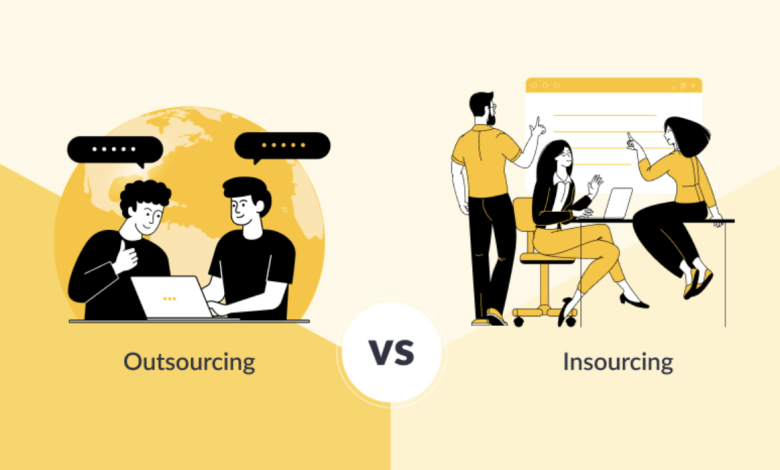
Nowadays, organizations can manage their site design, digital marketing, and other business activities in various ways. Outsourcing and insourcing are two of these methods.
But which one of these two techniques would work best for your company? Should you employ firms or independent contractors not already associated with your company? Or should you decide to hire additional workers or outsource the work and assign it to your current staff members?
However, you should thoroughly consider outsourcing vs. insourcing advantages and disadvantages before determining which route to choose for your company.
Let’s check this in detail.
Outsourcing vs Insourcing: Pros and Cons
Both outsourcing and insourcing can impact your company’s costs, security, employment practices, and communication methods.
Let’s carefully examine outsourcing vs. insourcing advantages and disadvantages to see where each method excels and fails.
Pros Of Outsourcing
Here are some pros of outsourcing:
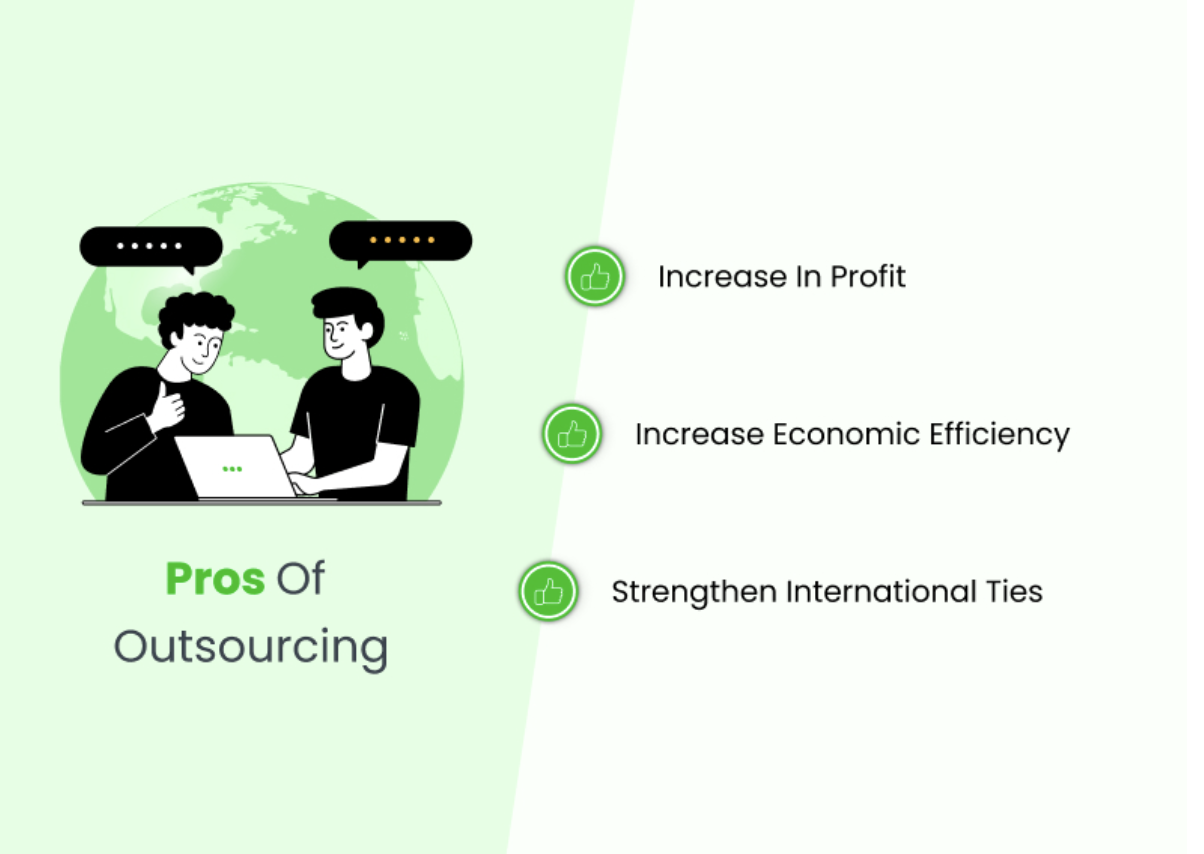
-
Increase In Profit
Companies typically outsource the production of goods and services if they believe doing so will enable them to save money and, as a result, boost their profitability. The cost of labor is the most typical illustration of this. Companies may offshore or outsource their work to a nation with reduced labour prices.
While some may view the loss of local jobs as a drawback of outsourcing, businesses find it difficult to resist the potential gain in earnings. Additionally, businesses may outsource to scale their operations or to save the cost of acquiring, training, and retaining all internal staff.
-
Increase Economic Efficiency
The opportunity costs of creating or producing a good or service lead some businesses to outsource. For instance, the CEO of a software startup may outsource HR because she believes that meeting with venture capitalists and training her tech staff would be a better use of her time than handling employee benefits.
Businesses often gain when highly skilled individuals can outsource low-value jobs and spend more time on high-value projects. Outsourcing proponents assert that assigning jobs to persons with the right expertise for those activities and allowing highly skilled workers to be more productive can also boost economic efficiency.
-
Strengthen International Ties
According to some experts, the more trade relationships between nations, the lower the likelihood of war between them and the easier it will be for them to work together to achieve common objectives. Outsourcing a dedicated development team improves links between businesses in two or more nations and ties between those nations’ governments.
Cons Of Outsourcing
No matter how much you decide to outsource work, it can significantly impact who you recruit, the business as a whole, and possibly the economy. Let’s examine the main cons of extensive outsourcing.
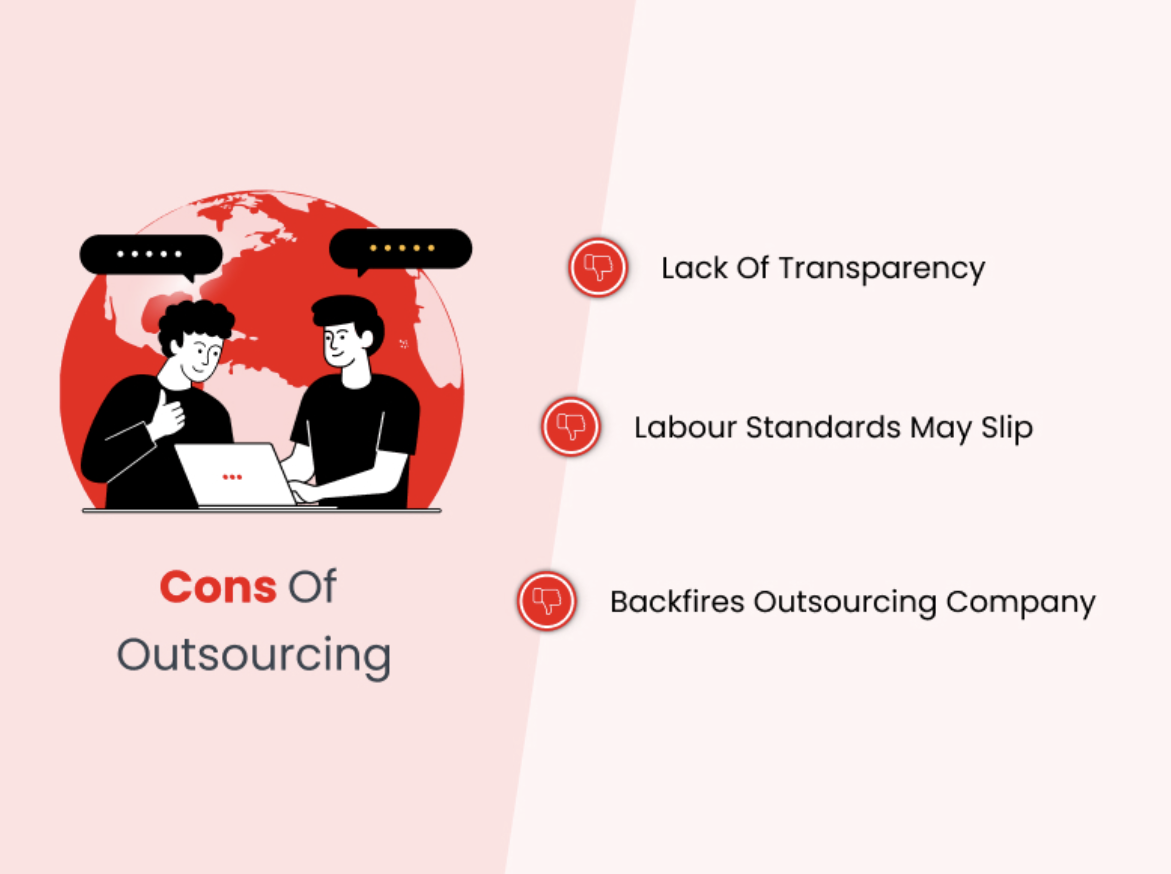
-
Lack Of Transparency
Consumers are becoming increasingly interested in the manufacturing process and source of their products. Having this level of transparency is challenging when outsourcing. A U.S. company might contract out a portion of its operations to, say, a Bangladeshi company, which might then contract out staffing to another company.
Is the employment agency, the Bangladesh manufacturer, the American apparel firm, or all three at blame if employees in a Bangladesh factory are working in hazardous conditions? Following the money and the labour to acquire insight into a company’s supply chain is more difficult when outsourcing.
-
Labour Standards May Slip
Some outsourcing skeptics claim that outsourcing causes a general lowering of the labour and environmental standards relevant to the products and services Americans use. NAFTA critics frequently bring up this criticism.
A U.S. corporation may not produce a good or service that meets the criteria that the U.S. government has decided should be followed in our nation if it outsources to a nation with lower wages, laxer labour laws, or lower environmental standards. That is a dilemma for all consumers, not just Americans, who want to feel good about the origins of their purchases.
Additionally, it is an issue for communities affected by pollution abroad and employees in other nations who cannot obtain the wages necessary for success.
Plus, if more items are produced in nations with laxer environmental regulations, the net contribution to climate change rises. Outsourcing may also push out local small enterprises and farms in underdeveloped nations.
-
Backfires Outsourcing Company
For the businesses that outsource, it isn’t necessarily a money-saving home run. They may discover that the outsourced company misses deadlines, performs poorly, or negatively impacts business. Costs can exceed expectations, or there might be communication issues. Outsourcing can be risky, particularly for smaller businesses.
Pros Of Insourcing
Listed below are the pros of insourcing:
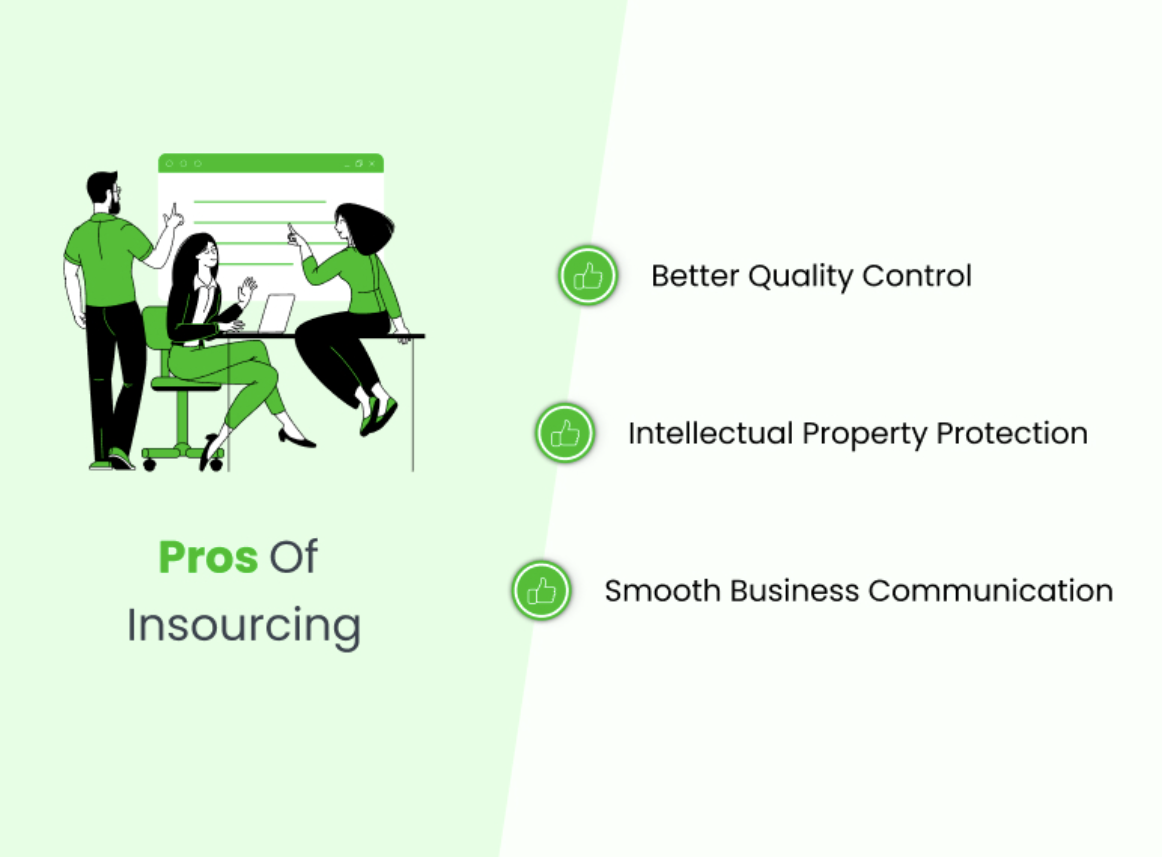
-
Better Quality Control
You can build stronger connections with the important stakeholders in your project by insourcing your personnel.
Since no middleman is involved in this equation, you will also learn vital details about how your team makes decisions. As and when your project develops, you can test and make adjustments.
In the end, you’ll have total control over your project’s development and the caliber of your finished output.
-
Intellectual Property Protection
If there is an intellectual property breach, your staff, research, and finances could be at risk.
But fortunately, working with an insourced team eliminates the possibility of a leak to a third-party provider, making maintaining your intellectual property simpler.
-
Smooth Business Communication
There is little likelihood of misinterpretation when you insource your team for a project.
Since you and your team share an office space, face-to-face interactions are frequently possible.
To guarantee that your team communicates effectively, employ non-verbal clues like gestures and facial expressions in addition to spoken communication.
However, if the insourced staff works remotely, the same applies. Your insourced personnel will be accessible during all business hours because they are fully committed to your organization.
Cons Of Insourcing
Here are some of the cons of Insourcing:
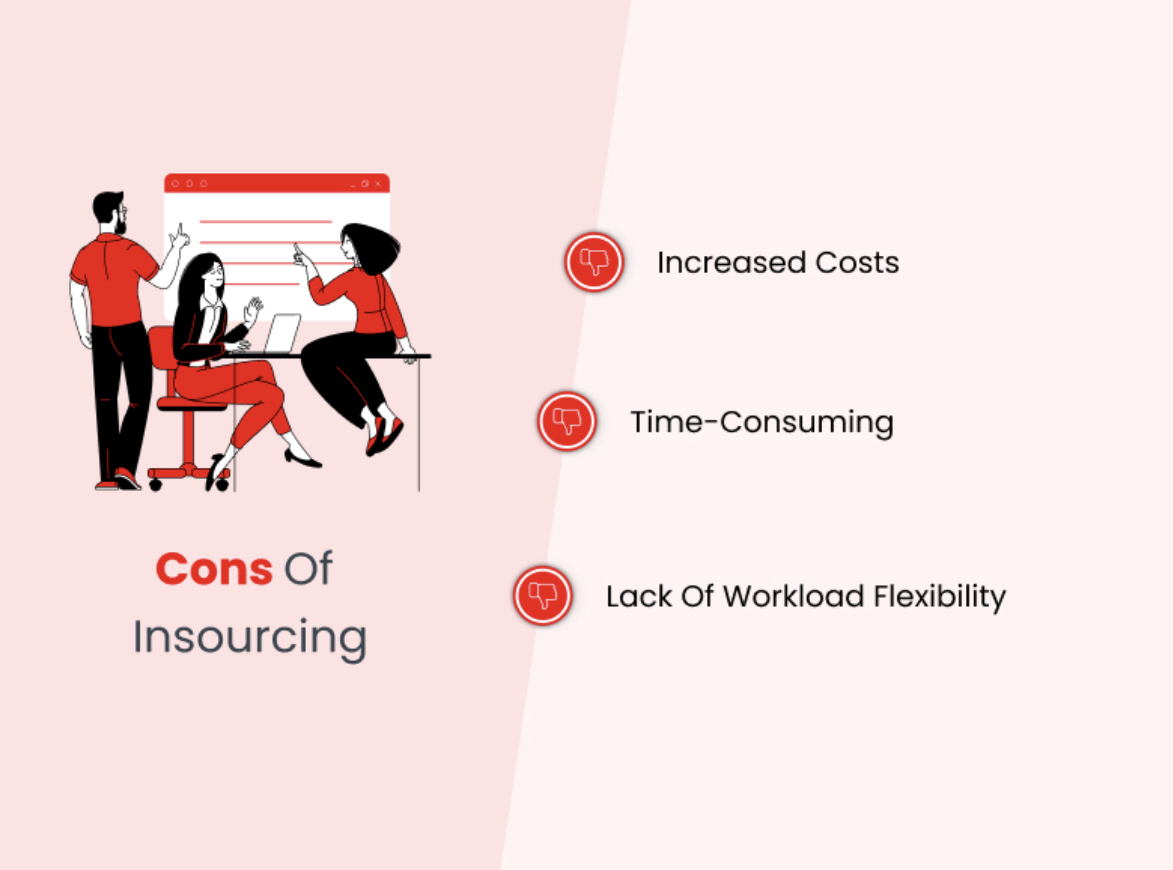
-
Increased Costs
Insourcing your employees will increase your hiring and labor expenditures. You’ll need to invest money in the following:
- vetting and recruiting every new hire
- paying them a salary every month
- paying for benefits like paid time off, sick days, new tools of the trade, etc
-
Time-Consuming
Typically, hiring staff through insourcing takes a lot of time. Even after you’ve located the ideal applicant for a specific position, you’ll need to train the new hire so they can comprehend the range of your company’s operations.
It can be challenging for your current staff to execute a new procedure for operations or create divisions for new projects. The division of your team’s attention among various divisions could ultimately reduce productivity.
-
Lack Of Workload Flexibility
Your employees’ ability to modify their workloads in response to variables like project deadlines, unanticipated delays in deliverables, etc.
Your organization typically needs this flexibility when taking on a new project because your staff will be required to assume more responsibility.
In outsourcing, managing the workload is a simple process because an outsourcing partner can offer the required capacity. Establishing this kind of flexibility within your team takes time and effort.
Your current staff will already be working on lengthy projects, so they won’t have the flexibility to take on more work right once. Your internal team can consequently feel overworked and uninspired.
Outsourcing vs. Insourcing: Key Differences
Here are some of the primary distinctions between insourcing and outsourcing:
| Category | Outsourcing | Insourcing |
| Location of Operation | Owned by an outside organization | Performed within Company’s site |
| Types of Business Activities | Non-core business activities such as IT services, content creation, cybersecurity, HR activities, cybersecurity, content creation, etc., can be handled by an outsourced team | Core activities such as investing, budgeting etc., are handled by the in-house team |
| Control Over Operations | Share operational controls with an outsourcing provider | Control over a specific task or project |
| Cost | Relatively cost-effective | Expensive |
Also Read: Revealed! Top 10 Benefits of Using Xamarin for Mobile App Development
Final Thoughts
Insourcing and Outsourcing are wise sourcing strategies. You can develop long-term resources within your company with the aid of insourcing.
However, outsourcing might help you save money and complete your jobs quickly. Both of these sourcing options have their share of restrictions.
You can take advantage of software outsourcing services or can go for insourcing. Meanwhile, insourcing can be difficult due to the high costs of headhunting and training. You could run into issues with outsourcing regarding quality control and data security.




